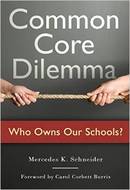On March 03, 2016, president of the National Center on Education and the Economy (NCEE), Marc Tucker, published an EdWeek opinion piece entitled, "Why the Common Core Will Be Declared a Failure." (Based on the link, Tucker's original title was, "Why the Common Core Will Be Declared a Failure and Why That Will Be Dead Wrong.")
In short, according to Tucker, the Common Core State Standards (CCSS) will fail because it is so advanced that the rest of the education system to which it must belong is bumbling by comparison and must be brought into line for CCSS to succeed.
To illustrate his point, Tucker uses an automotive metaphor whereby CCSS is "a 2016 fuel injector" that has been installed in the education system of "a 1910 Model T":
Imagine that you have in your hand a set of fuel injectors for a modern automobile. These devices, used for making sure that each cylinder in your car's engine gets just the right amount of fuel at just the right moment, are high precision devices, a key component of the car's engine. Now suppose that a time traveller from 1910, having made this exciting discovery, races back to 1910 and sticks a purloined fuel injector into his brand new Model T, expecting it to produce a remarkable improvement in the performance of his car. Of course, nothing of the sort happens. His Model T won't work at all. Why? Because a car engine is a system, all the parts of which have to be designed to work with the other parts.
Education systems are, well, systems, and, like cars, don't work very well if their parts and pieces have not been designed to work in harmony with one another. Only a fool would expect that putting a 2016 fuel injector into a 1910 Model T would enable the Model T to perform like a modern automobile. Similarly, anyone who expected the Common Core standards to produce big improvements in student performance by themselves, without major changes in many other aspects of our education system, was expecting the impossible. Well crafted student performance standards are an essential ingredient in the educational equivalent of the modern high performance education system, but they will make no difference at all to student performance unless the other parts of the education system are crafted to use those standards to get the desired results.
Tucker must assume that CCSS fits the bill of "well crafted student performance standards." Let's let that one ride. What particularly caught my attention is this truth:
There is no universal fuel injector.
Tucker is trying to promote CCSS as an American public education universal, yet the analogy he uses is not universal.
Even though there is not much to a fuel injector- it is only an electronically-controlled valve- fuel injectors are manufacturer-specific. (To read about fuel injection, click here.)
There are numerous variations on 2016 fuel injectors. On ebay motors, I selected one: the DENSO 297 2016.
In reading about the DENSO 297 2016, I noticed that prior to purchasing, I was asked to make sure that this particular fuel injector fit the automobile for which I was supposedly purchasing it. So, I looked up a number of 2016 automobiles.
The first I chose was the 2016 BMW Alpina B6 xDrive Gran Coupe Base Sedan 4-Door.
I received a message:
This part is not compatible with 2016 BMW Alpina B6 xDrive Gran Coupe Base Sedan 4-Door.
So, I tried a second vehicle, a 2016 Cadillac Escalade.
And another message:
This part is not compatible with 2016 Cadillac Escalade.
How about a 2016 Jaguar XJR?
This part is not compatible with 2016 Jaguar XJR.
All of the automobiles above are high-end cars. Yet the DENSO 297 2016 fuel injector was not designed for these cars- and the manufacturers of these cars are hardly likely to redesign their vehicles to fit the DENSO 297 2016 fuel injector.
All three of the above high-end cars operate using fuel injection; however, each has fuel injection that is specific to its engine.
So, Tucker's implication that Common Core is the 2016 fuel injector around which the 2016 automobile must be constructed crumbles when one considers the variation even among 2016 fuel injectors.
And to date, there has been no Gates-funded effort to "scale" fuel injection such that all American automobile manufacturers are baited to sign onto an agreement to adapt the engines of their vehicles to suit a single brand and model of fuel injector- and to do so before such a fuel injector has been designed- and that without any trial or testing prior to agreeing to forsake all manufacturer-specific fuel injectors for that single one.
No automobile manufacturer would be expected to logically agree to such an arrangement- yet this is precisely the ridiculous manner in which CCSS ended up in states across the nation.
Following his Model T analogy, Tucker does acknowledge that not all fuel injectors are alike. Some are "designed for a high performance engine"- as is CCSS, of course- and cannot have that "fighting chance" if installed in a low-performance engine":
I know of no state in the union that requires its teachers' colleges to teach its teachers how to teach courses that were created to embody the Common Core. ...
...In the rare instances in which the tests given to the students are set to the expectations incorporated in the Common Core, many teachers have a hard time doing what the tests intended for the students requires them to do.
This is a bit like having a fuel injector designed for a high performance engine, but an engine block, head, cylinders, fuel pump and drive shaft designed for a low-performance engine. The reality is that the Common Core has not been implemented in a way that would give it a fighting chance.
Interestingly enough, in February 2015, Consumer Reports published this article on the hushed-up downside of some high performance fuel injection systems: carbon buildup that actually clogs the engine over time and requires unanticipated maintenance and expensive repairs.
Even something as seemingly desirable as high performance could yield unanticipated and costly consequences.
Moreover, let us remember that education systems are more complex than automobiles because the component parts of education systems are human beings, and human beings cannot be manufactured into some "high performance" sameness.
If the DENSO 297 2016 is properly installed in the automobile for which it was made (it happens to be an after-market fuel injector designed specifically for Ford-Lincoln-Mercury vehicles from 2001-2005), then it will work. The other parts of the car will not resist. However, if teachers and administrators do not view CCSS (or components of CCSS) as suitable to teaching and learning, then even in states in which CCSS is formally adopted, those teachers and administrators are able to reject CCSS as an act of the will.
Tucker's analogy not only fails because there exists no single, specific fuel injection valve around which all auto manufacturers center the construction of their engines; his analogy fails because it is mechanical.
Human systems are a whole lot messier.
He writes that his conclusions are informed by his studying "the best education systems in the world." How that leads to CCSS as the center of American public education Tucker does not detail.
Nor does he offer a peep about any potential unanticipated consequences of the CCSS-centric education system.
He writes about the tests, and curriculum, and training teachers specifically to teach CCSS- and he concludes with the following floral arrangement:
Treat standards like a silver bullet, and they will go down to defeat just like all the other silver bullet solutions. Treat them like an essential component of a high performance system and put the other components of the systems in place and get out of the way before you are run over by the improvements you will see in student performance. A few states are beginning to accept this challenge. Those are the states to keep your eye on.
No amount of adjusting the testing, or the curriculum, or professional development, is able to force teachers and administrators to conform to CCSS. Many will only continue to finesse this test-score-centered education reform byproduct:
Game the system.
You see, gaming the system is the real fruit of corporate reform in these United States, and CCSS is only a part.
***
Originally posted 03-03-16 at deutsch29.wordpress.com
Schneider is a southern Louisiana native, career teacher, trained researcher, and author of the ed reform whistle blower, A Chronicle of Echoes: Who's Who In the Implosion of American Public Education.
She also has a second book, Common Core Dilemma: Who Owns Our Schools?.



